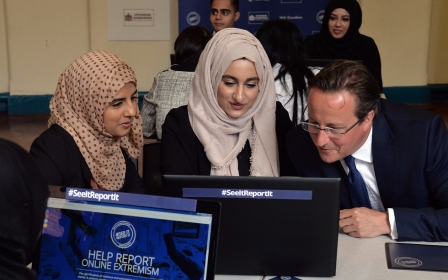UK teachers told to monitor pro-Palestine students for extremism

Teaching staff at British universities, colleges and schools are being encouraged to consider Muslim students who display an interest in Palestinian issues as vulnerable to being drawn into terrorism, leaked training documents have revealed.
The advice is contained in e-learning presentations being offered commercially to schools and higher education institutions to help them train their staff to fulfil their obligations under the government’s Prevent counter-extremism strategy to monitor students for radicalisation.
The presentations, which have been produced by educational consultancy firm Marshall E-Learning, list Palestine alongside Syria and the growth of the Islamic State (IS) group as issues that need “careful monitoring by those involved in safeguarding”.
In a section entitled “Extremism FAQs,” in response to the question “Isn’t it all just about Muslims?” the presentation states that “Islam has become a focus for acts of terrorism both in the UK and across the world”.
It says that the vast majority of UK Muslims are opposed to extremism and that “Muslims should never be treated as a ‘suspect community’,” but adds: “Nevertheless, as recent stories involving vulnerable pupils have shown, issues around Palestine, Syria and the growth of ISIL/ISIS require careful monitoring.”
The training presentations are not part of the government's official Prevent training material for public sector workers, commonly known as WRAP (Workshops to raise awareness of Prevent), which more than 350,000 public sector workers have undertaken in the past five years, according to the Home Office.
But Marshall states on its website that its Prevent training courses, which are also marketed at prisons, healthcare providers and local authorities, “provide an excellent introduction or refresher for dealing with extremism and radicalisation”.
Since the introduction of a new Counter-Terrorism and Security Act last year, teachers and other public sector workers have had a legal duty to have "due regard to the need to prevent people from being drawn into terrorism".
The e-learning presentations and official WRAP training material were among a batch of documents published online on Wednesday by the civil liberties campaign group Cage, which said it was making them public in the interests of transparency amid concerns about the extension of Prevent into schools and other public sector settings and complaints in Muslim communities that the strategy is discriminatory.
Cage said that freedom of information requests concerning Prevent training material had been repeatedly blocked by the Home Office. It said one request was rejected on the grounds it could "increase the risk from terrorism" by "providing useful information to extremists who wish to radicalise others about how public sector workers are trained to spot the signs of vulnerability”.
'Feeding alienation'
“Cage has decided to make this information available to the public as a necessary step to allow academics, researchers, campaigners, journalists and students to research and analyse Prevent training,” said Ibrahim Mohamoud, Cage’s spokesman.
“The assumption that public sector workers can be trained in a few hours on a complex issue such as understanding the pathways to politically motivated violence is naive and dangerous.
"Prevent only adds to the alienation being fed by anti-Muslim attacks by politicians and right-wing commentators.”
Mohamoud told Middle East Eye that highlighting Palestine as an issue potentially linked to extremism risked "problematising" an issue of concern to Muslim communities in the UK and could lead to inappropriate referrals to Channel, the government's police-led counter-radicalisation programme for young people.
"Palestine and the politics that surround the conflict in the region is very close to large portions of Muslim communities in the UK. With the presentation specifically singling it out for mention, the training problematises what would usually be considered positive social justice concern," he said.
Last week, David Anderson, the UK's independent reviewer of terrorism legislation, called for an independent inquiry into Prevent, citing concerns that aspects of the programme were ineffective and being applied in an “insensitive or discriminatory manner”.
The UK parliament’s Joint Committee on Human Rights also announced an inquiry into the government’s counter-extremism strategy and its compliance with European human rights law.
Palestine-related activism has been flagged up in other training material produced for teachers and public sector workers as a possible indicator of radicalisation.
A police leaflet produced for schools in 2014 to help teachers make judgments about referrals to Channel included a case study in which a student's discussion of "Palestine and other international conflicts" was deemed salient information.
'Terrorist-like views'
Last year, a teenaged boy revealed he had been questioned by police and accused of holding “terrorist-like views” after being referred to Channel by teachers after distributing leaflets for Friends of al-Aqsa, a Palestinian rights organisation, during Israel’s 2014 war in Gaza.
Teachers also reported being told by police that they should “keep an eye” on students who attended demonstrations against Israeli bombing in Gaza.
“They are conflating a political issue, which requires a political solution, with extremism and stifling that debate actually breeds extremism,” Ismail Patel, chairman of Friends of al-Aqsa, told MEE.
“We need to appreciate that if we stifle debate it means that people will feel that their rights are being eroded and they have no other means to express their grievances.”
Michael Howard, a spokesman for Marshall, told MEE that the company had taken care to ensure that its Prevent training courses were "developed in a very objective and non-political way".
"The aim was to fulfil a legislative remit for educational establishments within the UK. We took a lot of advice from interested parties and from a legal perspective to ensure that it is not an anti-Muslim course,” he said.
Marshall said the course did not single out Palestine as an issue but mentioned it along with other "issue sets" related to extremism, such as the activities of the Animal Liberation Front and far-right groups.
"We don’t specifically target Palestine as an issue area. We talk about all extremism that could lead to radicalisation," he said.
A Home Office spokesperson told MEE that there were a range of commercial suppliers of counter-radicalisation training and said that Marshall's materials were separate to the government's.
He also said there was no mention of Palestine in official WRAP training material and stressed that the government did not consider support or sympathy for the Palestinian cause to be an indicator of vulnerability to radicalisation.
New MEE newsletter: Jerusalem Dispatch
Sign up to get the latest insights and analysis on Israel-Palestine, alongside Turkey Unpacked and other MEE newsletters
Middle East Eye delivers independent and unrivalled coverage and analysis of the Middle East, North Africa and beyond. To learn more about republishing this content and the associated fees, please fill out this form. More about MEE can be found here.




